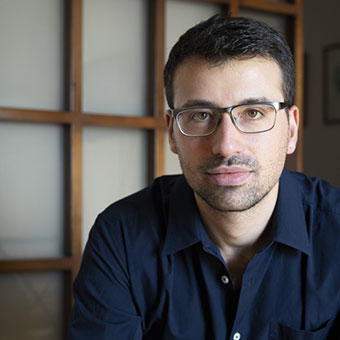Student Profile: Giuseppe Desiato, Music Composition and Theory
 April 7, 2023
April 7, 2023
Anna Valcour | Graduate School of Arts and Sciences
Giuseppe Desiato, a PhD student in the department of Music Composition and Theory, has received two Connected PhD experience grants and one higher education administrative grant. In summer 2022, Giuseppe learned a variety of coding languages required for entering a career in the sound industry. For his second grant, he gained experience in audio recording, sound engineering, and music production through an internship with audio recording engineer and producer Joel Gordon. Recently, he has just started his fellowship with Brandeis Arts Engagement as they prepare for the Leonard Bernstein Festival of the Creative Arts (April 2023).
In this interview, Giuseppe recounts his summer experiences in learning code.
How did you hear about the Connected PhD and why did you apply last year?
I remember hearing about the Connected PhD in several departmental meetings, but it didn’t really click until later. Initially, I didn’t see a way in which the Connected PhD could be helpful for me or how I could relate to it. When I spoke one-on-one with Professor Yu-Hui Chang about opportunities at Brandeis, I mentioned that I wanted to expand my skills beyond composition and theory and she suggested I look into the Connected PhD. Speaking with her was really helpful, and I started to think I could follow this passion for building new skills in coding.
How did this project enhance your skills?
Firstly, many current composition jobs require technical skills – and sometimes those technical skills involve coding (Python, Java, or C++, etc.). If you’re teaching electronic music from the computer music perspective, you may also need coding knowledge. But when I started learning code, I realized that even if that direction was not successful, it could also help me enter the tech world and beyond. Obviously, I would love to stay in the music domain and do both, but it’s also a skill that I can use beyond the world of music and composition.
How do you see yourself building upon this experience in the future?
Apart from academia, this will be a very useful tool to have in my bag. In Massachusetts, there are so many cool industries like Bose (building speaker systems) or iZotope (audio processing and software for analyzing and editing sound). I think working for those kinds of industries could be a dream place for me! I’d be able to use my skills as an electroacoustic composer and utilize my technical side. These types of companies love that you have the theoretical knowledge, but they also need the practical, scientific aspects too. It’s an exciting world to learn these skills because it really opens a lot!
Have you had a favorite part or a favorite learning experience?
One project that I am trying to build is a booking system for the Slosberg Music Center at Brandeis. I am trying to build a way to book the practice rooms virtually. Last year, we had to book rooms by writing on a paper schedule posted on the wall. So, you had to go into Slosberg to book your room, and sometimes you would get there, and no rooms would be available. It’s a fun project that I’m starting to build that could really help our department. I’m also building other small projects that are not strictly related to music. For example, one project is a hiking app. I’m collecting data from the mountains around Boston. It’s a useful thing to learn and I love hiking. The app would suggest different trails, difficulties, etc.
What advice do you have for current students as they propose on their own projects?
These projects can really help you and can enlarge your vision and your opportunities! I’m not a U.S. citizen, so I’m constantly thinking about what’s my next step. After a lot of research, I found that these skills could match my course of study in academia and beyond. I spoke with many professionals and asked lots of questions before designing a plan and project to pursue. The fact that I’m gaining real, applicable, transferable skills through this experience, could really help me. I’m so grateful for this opportunity with the Connected PhD. It’s fantastic! It’s also good because it demonstrates that Brandeis supports alternative career paths for their students and shows that people in academia are thinking about what’s happening to the students after they graduate.
Recently, we followed up with Giuseppe to ask our final question. Looking back, how have these three separate grants built on each other?
These three separate grants have built on each other by providing well-rounded learning and growing experiences, each focusing on a different aspect of the music or artistic industry. Specifically, the last grant I received allowed me to intern as an associate producer for the Brandeis Festival of the Arts. This internship was another genuinely enriching experience. After learning technical skills from my previous grants, this final grant gave me the opportunity to explore the organizational and managerial aspects of an arts festival. It exposed me to a completely different set of tasks and skills, such as networking, planning, coordinating, and executing various aspects of a festival. These three grants significantly broadened my skills as a composer, and each one introduced me to different professional worlds (that are interwoven), and opened doors to diverse job opportunities beyond academia.






